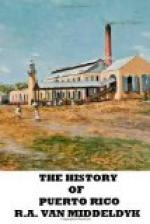By this time the famous debates in the British Parliament and other signs of the times announced the dawn of freedom for the oppressed African race. Wilberforce, Clarkson, and Buxton, the English abolitionists, continued their denunciations of the demoralizing institution. Their effects were crowned with success in 1833. The traffic was abolished, and ten years later Great Britain emancipated more than twelve million slaves in her East and West Indian possessions, paying the masters over one hundred millions of dollars as indemnity.
Spain agreed in 1817 to abolish the slave-trade in her dominions by May 30,1820. By Articles 3 and 4 of the convention, England offered to pay to Spain $20,000,000 as complete compensation to his Catholic Majesty’s subjects who were engaged in the traffic.
The Spanish Government illegally employed this money to purchase from Russia a fleet of five ships of the line and eight frigates.
The slaves in Puerto Rico were not emancipated until March 22, 1873, when 31,000 were manumitted in one day, at a cost to the Government of 200 pesos each, plus the interest on the bonds that were issued.
The nature of the relations between the master and the slave in Puerto Rico probably did not differ much from that which existed between them in the other Spanish colonies. But these relations began to assume an aspect of distrust and severity on the one hand and sullen resentment on the other when the war of extermination between whites and blacks in Santo Domingo and the establishment of a negro republic in Haiti made it possible for the flame of negro insurrection to be wafted across the narrow space of water that separates the two islands.
There was sufficient ground for such apprehension. The free colored population in Puerto Rico at that time (1830-’34) numbered 127,287, the slaves 34,240, as against 162,311 whites, among whom many were of mixed blood.[67] Prim, the governor-general, to suppress every attempt at insurrection, issued the proclamation, of which the following is a synopsis:
“I, John Prim, Count of Ecus, etc., etc., etc.
“Whereas, The critical circumstances of the times and the afflictive condition of the countries in the neighborhood of this island, some of which are torn by civil war, and others engaged in a war of extermination between the white and black races; it is incumbent on me to dictate efficacious measures to prevent the spread of these calamities to our pacific soil.... I have decreed as follows:
“ARTICLE 1. All offenses committed by individuals of African race, whether free or slaves, shall be judged by court-martial.
“ART. 2. Any individual of African race, whether free or slave, who shall offer armed resistance to a white, shall be shot, if a slave, and have his right hand cut off by the public executioner, if a free man. Should he be wounded he shall be shot.




